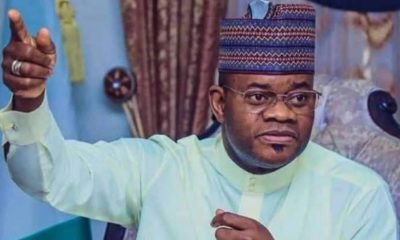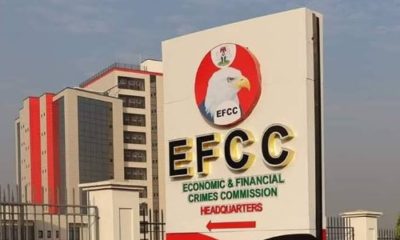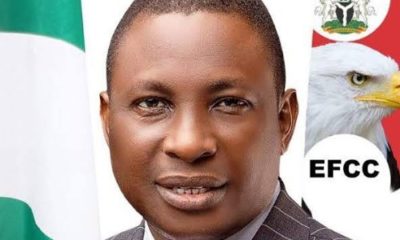Finance
EFCC begins fresh probe into Dokpesi’s N8bn sport deal
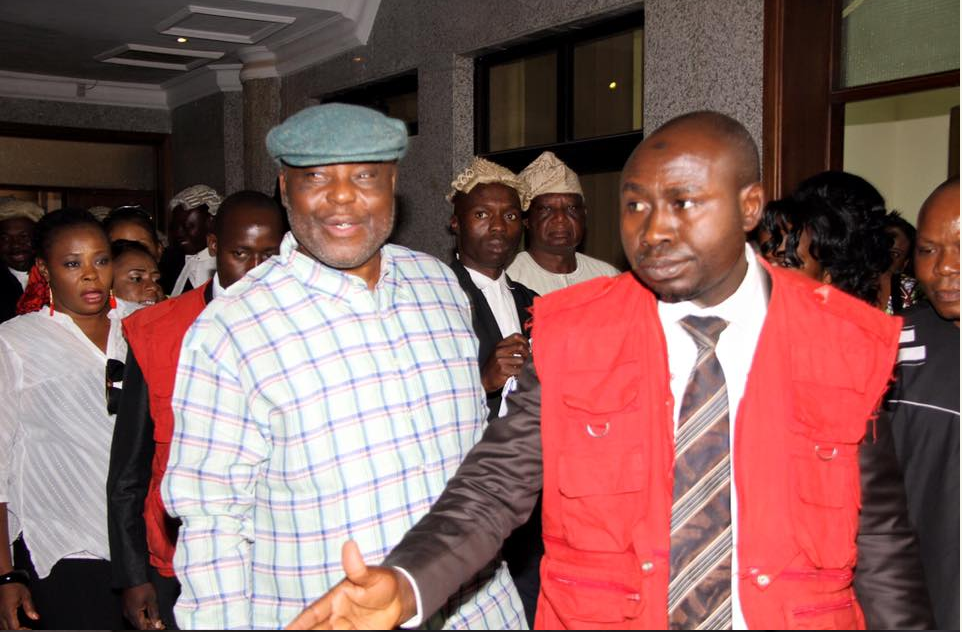
Fidelis Soriwei and Ade Adesomoju
ABUJA-The hope of the former Chairman, DAAR Communications Plc, Chief Raymond Dokpesi, of being granted bail by Justice Gabriel Kolawole of a Federal High Court, Abuja, dimmed on Thursday after the Economic and Financial Crimes Commission said it had opened a fresh probe into the payment of N8.4bn to the businessman by the Federal Government.
 Counsel for the EFCC, Mr. Rotimi Jacobs, said this while opposing Dokpesi’s application for bail as canvassed by his lawyer, Chief Mike Ozekhome (SAN), during Dokpesi’s appearance in court in Abuja.
Counsel for the EFCC, Mr. Rotimi Jacobs, said this while opposing Dokpesi’s application for bail as canvassed by his lawyer, Chief Mike Ozekhome (SAN), during Dokpesi’s appearance in court in Abuja.
On Wednesday, Ozekhome had said his client had been in the EFCC custody for eight days, adding that the offences, for which the embattled businessman was standing trial, were bailable.
The judge had adjourned hearing of the bail application till Thursday after the EFCC counsel indicated that he needed time to file a counter-affidavit opposing it.
Dokpesi was on Wednesday arraigned along with his firm, Daar Investment and Holdings Limited, on six counts of money laundering and procurement fraud, instituted against him by the EFCC.
The EFCC charged Dokpesi and DIHL with fraudulent receipt of N2.1bn from the Office of the National Security Adviser between October 2014 and March 19, 2015, for the Peoples Democratic Party’s presidential media campaign in breach of the provisions of the Public Procurement Act, Money Laundering (Prohibition) Act and the EFCC (Establishment) Act.
He pleaded not guilty to all the six counts on Wednesday.
Justice Kolawole had, after the arraignment on Wednesday, ordered that Dokpesi be remanded in the EFCC custody and be produced in court on Thursday for the hearing of his bail application.
During the hearing of the application on Thursday, Ozekhome urged Justice Kolawole to grant bail to his client.
The lawyer argued that the offences, with which Dokpesi was charged, were ordinarily bailable because they were not capital offences.
He said Dokpesi had not, in any way, contributed to any act of insurgency in the country and that he would not jump bail.
Similarly, the defence lawyer contended that Section 36 of the 1999 Constitution presumed his client innocent until the contrary was proved by the prosecution.
Opposing the bail application, however, Jacobs urged the court to reject the application on the grounds that the Federal Government was investigating a fresh allegation of N8.4bn the accused collected for airing the FIFA Under-17 championship, which Nigeria hosted in January, 2012.
Jacobs added that the airing right was given to DAAR Communications by FIFA and the Federal Government was not a party to the contract for which he allegedly collected N8bn from the Nigerian government.
Jacobs said, “Here is a man, who in 2012, collected over N8bn for the contract for airing of the Under-17 World Cup organised by FIFA. Nigeria was not part of the contract agreement with FIFA, yet, this applicant collected the huge sum from the treasury of this country.
“Again, let me say here that Nigeria is bleeding and it is the duty of everybody, including judges in court, to ensure that we fight and put an end to corrupt tendencies in this country.”
He added that granting bail to the accused person would jeopardise investigation into the allegation.
He referred the judge to the affidavit filed in opposition to the bail application, indicating no contract paper was exchanged by Dokpesi and any agent of government when the N2.1bn was paid to him.
In response to the allegations, Ozekhome said Jacobs was being speculative.
He said, “The prosecution counsel is being speculative and giving evidence from the bar. When we get to the bridge, we will cross it and prove that there was no corruption as far the applicant is concerned.”
Ozekhome also told the court that his client was scheduled to travel abroad for medical attention when he received a call, inviting him to the EFCC office in Abuja and that without hesitation, Dokpesi honoured the invitation as a law-abiding citizen.
The senior advocate added that Dokpesi’s son would wed on December 17 and 19 and that as a father, he (Dokpesi) had sent invites to highly-placed Nigerians and as such, he would be around at all times to stand trial.
Jacobs also faulted the health grounds on which the bail application was predicated, arguing that the defence failed to disclose the nature of the ailment.
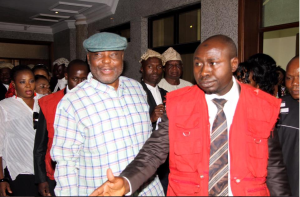 He explained that the letter of appointment, issued by the physician and exhibited by the defence, was written on December 5, when the accused was already in the EFCC custody.
He explained that the letter of appointment, issued by the physician and exhibited by the defence, was written on December 5, when the accused was already in the EFCC custody.
Jacobs said Dokpesi might jump bail due to the possibility of being jailed for seven years upon conviction.
But after the hearing on Thursday, the judge said he needed time to study the arguments canvassed by parties for and against the bail application before he could deliver his ruling.
He then fixed Monday for the ruling and ordered that Dokpesi be returned to the EFCC custody.
A large number of women and youths besieged the Federal High Court, Abuja, in solidarity with Dokpesi on Thursday.
The placard-bearing supporters were not allowed entry into the court premises but remained outside the gate throughout the court proceedings.
The judge had, on Wednesday, fixed initial trial dates for February 17, 18, March 2 and 3, 2016.
Meanwhile, there were strong indications on Thursday that the EFCC might invite the former Minister of Finance, Dr. Ngozi Okonjo-Iweala, in connection with its ongoing investigation into the procurement of arms under the past administration of President Goodluck Jonathan.
A source in the commission on Thursday said the commission was also looking into the role of the Central Bank of Nigeria in the release of the funds to the former National Security Adviser, Col. Sambo Dasuki (retd.), and others being probed as a result of the arms deal.
A top operative of the EFCC, who confided in one of our correspondents, said the commission had been working very hard to identify those who received funds from the ONSA because they could not lay their hands on documented evidence in the office.
It was learnt that the invitation, which might be sent to the former minister within a week, was not an indictment, but a move by the commission to get to the root of the arms deal.
Findings showed that Okonjo-Iweala would assist the EFCC in its ongoing investigation into the arms deal.
It was gathered that the 27-man Task Force, set up by the Chairman of the commission, Mr. Ibrahim Magu, had been working on evidence of funds released from the CBN to arrest those who were in the custody of the anti-graft agency.
The source added that while it was true that part of the recovered Abacha loot was spent on the campaign against insurgency at the time, the commission was of the view that not all the money was spent for that purpose.
The source explained for instance that the funds were spent on the procurement of arms for troops and the payment of the South African mercenaries, who trained a Strike Force and supplied intelligence to the military in the recovery of 22 local government areas from Boko Haram shortly before the general elections.
A former Commander of the South African Defence Force, Col. Eeben Barlow, had told the UK Telegraph, that his outfit, known as the Special Tasks Training, Equipment and Protection, trained an elite strike force in Nigeria to aid the campaign against insurgency.
Barlow was silent on the amount of money involved in the deal.
The source said, “You see these things are not as easy as you think. The Office of the NSA does not seem to have the type of documentation that we require to go after those involved.
“The belief here is that while some of the money might have been spent on arms and other security issues, not all of the funds went into that and of course, that is why there is a probe.
“As for the former Minister of Finance, she said clearly in her letter that the former NSA should report to the President on the disbursement of the funds.
“However, her name has been coming up, and there is a strong likelihood that she should be invited to make clarifications. I cannot tell you when but from what I know, she will appear to make clarifications.
“I must tell you that those, who presided over the disbursement in the CBN, will also be summoned to answer questions. Okonjo-Iweala may be invited next week because of the latest revelations.”
Our correspondent could not get the Head of Media and Publicity of the EFCC, Mr. Wilson Uwujaren, to comment on the story as calls to his mobile did not connect.
Okonjo-Iweala had on Wednesday said she transferred $322m from the looted funds recovered from a former Head of State, the late Gen. Sani Abacha, to the Office of the NSA for military operations in the North-East.
The former minister had, in a statement by her Media Adviser, Mr. Paul Nwabuikwu, said the transfer of the fund was approved after a committee set up by former President Jonathan gave approval for the use of the money.
She said based on the decision of the committee, she personally requested that part of the recovered fund be used for security operations while the rest be channelled into developmental purposes.
There was a report on Wednesday that the former minister allegedly diverted N61.4bn from the Abacha loot to Dasuki’s office.
PUNCH-
Banking
CBN Denies Currency Devaluation

The Central Bank of Nigeria (CBN) has refuted claims of devaluing the.
Earlier reports suggested that the CBN had devalued the Naira, lowering its exchange rate from N631 to the dollar, compared to the previous day’s rate of N461.60 at the Importers and Exporters (I&E) window.
However, the Central Bank of Nigeria (CBN) released a statement on Thursday through its Acting Head of Corporate Communications, Dr. Isa Abdulmumin, categorizing the report as false information.
In the statement titled ‘CBN Has Not Devalued The Naira’, he said the attention of the apex bank was drawn to the news report by an Abuja based newspaper edition of June 1, 2023, titled “CB Devalues Naira To 630/51”.
However, the CBN stated categorically that the news report was replete with outright FALSEHOODS and destabilizing innuendos, ‘reflecting potentially willful ignorance of the said medium as to the workings of the Nigerian Foreign Exchange Market.’
“For the avoidance of doubt, the exchange rate at the Investors’ & Exporters (I&E) window traded this morning (June 1, 2023) at N465/USS1 and has been stable around this rate for a while.
“The public is hereby advised to ignore the news report by Daily Trust in its entirety, as it is speculative and calculated at causing panic in the market,” the CBN spokesman added.
He, therefore, advised media practitioners to verify their facts from the Central Bank of Nigeria before publishing in order not to misinform the public.
Banking
BREAKING: CBN Increases Interest Rate By 0.5%

The interest rate in Nigeria has been raised to 18.5 percent, up by 0.5 percent, from 18 percent where it was pegged in March 2023.
The Central Banks of Nigeria’s (CBN) Monetary Policy Committee (MPC) resolved to this effect at its third meeting of 2023 in Abuja, on Wednesday.
Governor, CBN, Godwin Emefiele, made the disclosure in the communiqué of the MPC’s meeting, thereafter.
While engaging the media at the end of the two-day meeting, Emefiele, said the committee voted to keep the asymmetric corridor at +100 and -700 basis points around the MPR.
In the view of the MPC, rising inflation rate is traceable to the high energy cost and challenges around the supply chain, among others, which lie outside the corridors of the CBN.
Emefiele said, “The current trend in price development would continue to be monitored by the bank with greater collaboration with fiscal authority to address the drivers of inflation.”
Biztellers reports that the CBN had effected six consecutive interest rate increases, which has seen the rate move from 11.5 percent in March 2022 to 18.5 percent in May 2023.
Finance
Dangers Lurk As Nigerians Resort To Refurbished Gas Cylinders

In Nigeria, people have been forced to come up with creative solutions to cope with the effects of inflation and the economic crisis.
These improvised strategies have not only helped individuals save money, but also enabled them to stay afloat during difficult times.
In a concerning development, the recent trend of boycotting the high cost of cooking gas cylinders in Nigeria may pose a greater risk to lives than it does in terms of saving money.
Economy&Lifestyle investigations have revealed that the soaring prices of gas cylinders have reached a point where it has become increasingly challenging for average households to afford them, let alone refill them with gas.
The situation is further exacerbated by the fact that the pump price of kerosene, which would typically serve as an alternative, has become prohibitively expensive.
Upon investigation, it was found that the prices of gas cylinders vary depending on their sizes. A 3kg gas cylinder is priced at N14,000, while a 5kg cylinder costs N16,000. The larger cylinders are even more costly, with a 6kg cylinder priced at N17,000 and a 12.5kg cylinder costing N19,000.
Additionally, the expense continues when it comes to filling these cylinders with cooking gas, as it costs N2,600 for a 3kg cylinder, N5,200 for a 6kg cylinder, N8,950 for a 10.5kg cylinder, and N10,650 for a 12.5kg cylinder.
Consequently, an average household that needs to replace a worn-out 5kg cylinder would have to come up with N20,250 to purchase a new cylinder and fill it with gas, which can be a difficult feat to achieve.
As a result, many people have resorted to refurbishing their old cylinders and trying to use them as best as they can. However, this approach poses a significant danger.
Mrs. Rukayat Adesoji, a trader, shared her experience regarding her gas cylinder, which had become rusted and could no longer stand upright since last month. Due to the exorbitant prices of purchasing new cylinders, she resorted to seeking the assistance of a welder.
The welder patched the legs of the cylinder, repainted it, and ever since then, she has been using the refurbished cylinder for her cooking needs.
She said ““My gas cylinder which was 6kg got rusted and no longer stands erect since last month. When I asked for the price, I was told it was N17, 500. I was discussing it with a friend who advised me to take it to a welder to paint it and construct a new stand. I heeded to her advice and at the end spent just N3, 000 to turn my cooking gas to a brand new.”
Apart from refurbishing cylinders, some people don’t even know when their cylinders will expire. Mrs. Mercy Opara, a hair stylist, falls in that category as she explained: “I am taking my gas cylinder to the welder to spray it for me. It just cost N1, 500.
“The cost of buying a new cylinder is high. I have been using my cylinder for over 7 years and I don’t even know the expiry date. I just pray God blesses me so that I can buy a new one. But this one I am managing will look neat after spraying it for another two years.”
Mr. Adekanbi Joseph, a wielder, said he paints cylinder and “To paint and rebuild a cylinder stand, I charge N4, 500. Many people come here to paint as a new cylinder is now very expensive to get.”
Highlighting the potential dangers of using refurbished cylinders, Mr. Benjamin Hope, the Chief Executive Officer of FKT Cooking gas and general goods, emphasized the risks involved.
He stated that even a brand new cylinder can pose a risk of explosion if the locks are not properly secured after use or if the cylinder filled with gas is moved from one location to another.
He said “A brand new cylinder can explode if the locks are not well keyed after using and if the cylinder filled with gas was moved from one place.
“There are many reasons for the high cost of gas cylinders in Nigeria. One is the cost of importation due to the exchange rate. Another is the increased migration from the use of kerosene to cooking gas which has necessitated increased demand for gas cylinders. You know that in such a case there will be increased importation of cylinders.”he added



